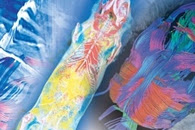| |  Neurons form circuits in our brain by creating tree-like branches to connect with each other. Newly forming branches rely on the stability of microtubules, a railway-like system important for the transport of materials in cells. Neurons form circuits in our brain by creating tree-like branches to connect with each other. Newly forming branches rely on the stability of microtubules, a railway-like system important for the transport of materials in cells. | |
|
| |  A research collaboration based in Japan has found a new pathological mediator of amyotrophic lateral sclerosis, which could have further implications for understanding the molecular breakdown that gives rise to the neurodegenerative disease that affects nearly half a million people around the world. A research collaboration based in Japan has found a new pathological mediator of amyotrophic lateral sclerosis, which could have further implications for understanding the molecular breakdown that gives rise to the neurodegenerative disease that affects nearly half a million people around the world. | |
|
| |  Identifying those who are at risk of dementia, a type of neurodegenerative disease, is crucial for early treatment and development of new therapies, a new study suggests. Dementia affected approximately 46.8 million people across the globe in 2015, and the number increased to close 50 million in 2017. By 2030, the number is expected to soar to 75 million. Identifying those who are at risk of dementia, a type of neurodegenerative disease, is crucial for early treatment and development of new therapies, a new study suggests. Dementia affected approximately 46.8 million people across the globe in 2015, and the number increased to close 50 million in 2017. By 2030, the number is expected to soar to 75 million. | |
|
| |  A University of Houston chemist is exploring the link between copper protein molecules in brain cells and neurodegenerative diseases like Alzheimer's. "Scientists have studied Alzheimer's disease for 100 years and still no one knows the cause," said assistant professor of chemistry Tai-Yen Chen, who will use his $1.9 million award from the National Institute of General Medical Sciences to advance his theory that the balance of copper protein within a single cell may be a culprit. A University of Houston chemist is exploring the link between copper protein molecules in brain cells and neurodegenerative diseases like Alzheimer's. "Scientists have studied Alzheimer's disease for 100 years and still no one knows the cause," said assistant professor of chemistry Tai-Yen Chen, who will use his $1.9 million award from the National Institute of General Medical Sciences to advance his theory that the balance of copper protein within a single cell may be a culprit. | |
|
| |  The team's findings describe for the first time the changes that take place in the genetic material of excitatory neurons in the hippocampus of adult mice when they activate. An international study headed by researchers of the Neurosciences Institute, mixed center of the Universidad Miguel Hernández (UMH) and the Spanish National Research Council (CSIC), has revealed a new analysis of the changes in the organization of the genetic material of neurons that is triggered by neural activation. The team's findings describe for the first time the changes that take place in the genetic material of excitatory neurons in the hippocampus of adult mice when they activate. An international study headed by researchers of the Neurosciences Institute, mixed center of the Universidad Miguel Hernández (UMH) and the Spanish National Research Council (CSIC), has revealed a new analysis of the changes in the organization of the genetic material of neurons that is triggered by neural activation. | |
|
| |  Implantable brain electrodes have been around for quite some time now, both for diagnosing and treating neuropsychiatric conditions like Parkinson’s disease. However, one limitation of conventional probes is their size and rigidity, compared to the soft, gelatinous consistency of the brain. Implantable brain electrodes have been around for quite some time now, both for diagnosing and treating neuropsychiatric conditions like Parkinson’s disease. However, one limitation of conventional probes is their size and rigidity, compared to the soft, gelatinous consistency of the brain. | |
|
| |  Much of the research on the underlying causes of Alzheimer's disease focuses on amyloid beta (Aß), a protein that accumulates in the brain as the disease progresses. Excess Aß proteins form clumps or "plaques" that disrupt communication between brain cells and trigger inflammation, eventually leading to widespread loss of neurons and brain tissue. Much of the research on the underlying causes of Alzheimer's disease focuses on amyloid beta (Aß), a protein that accumulates in the brain as the disease progresses. Excess Aß proteins form clumps or "plaques" that disrupt communication between brain cells and trigger inflammation, eventually leading to widespread loss of neurons and brain tissue. | |
































.png)












No hay comentarios:
Publicar un comentario